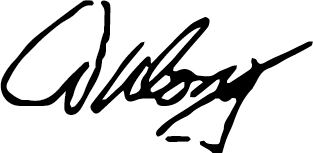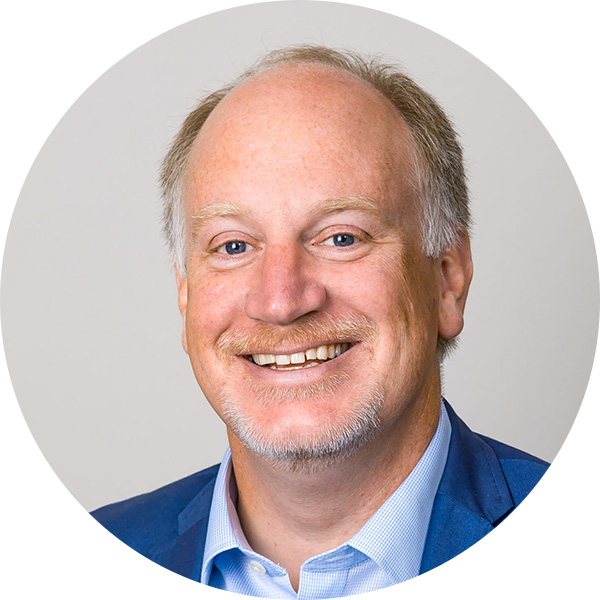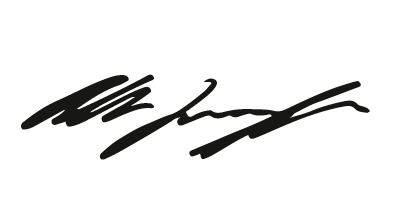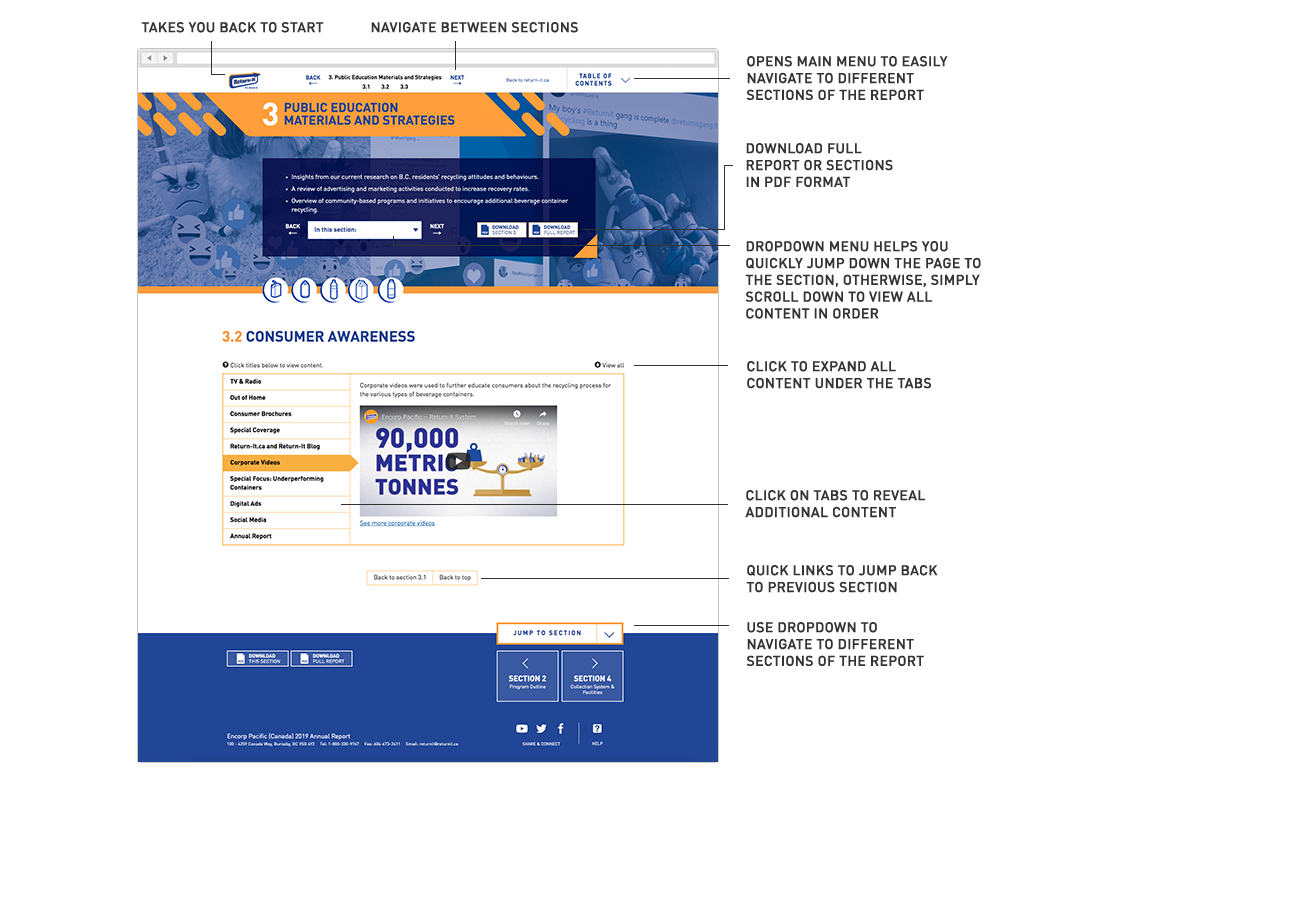2 Program Outline
- Our vision, mission statement and strategic business model.
- Message from the Chair and CEO, successes and opportunities in 2019.
2.1 What Drives Us
Encorp Pacific (Canada) is the not-for-profit stewardship agency appointed to fulfill the requirements of the Recycling Regulation, Schedule 1, Beverage Container Product Category (BC Reg.449/2004). The Encorp Stewardship Plan covers all ready-to-drink beverage containers for soft drinks, juice, water, wine, coolers and spirits, plus nonrefillable beer bottles sold in British Columbia.
Encorp has 25 years of leading extended producer responsibility performance in Canada and diverting more than 20 billion beverage containers from the landfill. return-it.ca
- Vision
- To be the model Industry Product Stewardship organization in a province where every beverage container is recycled.
- Mission
- To deliver convenient, cost-effective and responsible collection and recycling systems for beverage containers and offer strategic service provision for compatible consumer packaging and end-of-life products.
- Role
- Our role as a stewardship agency is to facilitate brand owner/producer compliance with the Recycling Regulation by organizing recycling programs from collection and transportation through to final recycling into a variety of end-of-life packaging and products.
Encorp's Business Model
Since its inception, the Encorp business model has utilized outsourcing as the key component for delivering on its mandate.
Encorp has developed and maintained a set of core competencies within a small managerial and administrative team responsible for strategic planning, financial management, consumer awareness, infrastructure development, information technology and public transparency. All other operational activities are delivered through a network of independent contractors such as depot operators, transporters and processors. This contract management model allows Encorp to regularly test the market for cost competition without having to support any capital investments of its own.
The advantages of this model include:
Market-based costs – Regular reviews of costs ensure that any recent improvements in efficiency and technology can be exploited.
Scalability – Changes in demand can be accommodated rapidly.
Flexibility – Changes in market behaviour can be quickly adapted to.
Innovation – New ideas can be tested, assessed and, where feasible, incorporated into the overall business model.
In essence, the Encorp model is similar to that of many manufacturing industries which retain their key strategic strengths in-house but outsource most aspects of producing their products. The flexibility of this model makes it possible for Encorp to continue adapting to changing market trends.
2.2 Message From the Chair
The year 2019 was Encorp Pacific (Canada)’s twenty-fifth anniversary. This is a tremendous milestone and we are immensely proud of what we have accomplished over the past quarter century of operations. What began as a pragmatic solution to the obligations imposed on beverage manufacturers and retailers by an outdated regulation has since become one of the leading beverage container collection systems in North America and a vital element of British Columbia’s forward-looking approach to Extended Producer Responsibility (EPR). That we’ve come such a long way is a credit to all the stakeholders – brand owners, retailers, depot operators, transporters, material processors, industry partners and myriad service providers – who’ve participated with us on this journey. On behalf of our Board of Directors, thanks to all of you for your support.
In the future, we may also look upon 2019 as a pivotal year – an inflection point – in the evolution of beverage container recycling in B.C. For in 2019, our management team implemented numerous system improvements and innovations to enhance the collection experience for B.C. consumers and increase the volume of containers collected, not least of which was adjusting the deposit level for non-alcoholic containers up to one litre in size. The fruits of these labours are reflected in our recovery rate, which in 2019 increased for the second consecutive year, to 78.1%, following a period of relative stagnation.
Details of these initiatives are described elsewhere in this annual report, but whether through the accelerated rollout of Return-It Express locations in urban areas or new initiatives to increase consumer access to recycling services in remote locations, the Board of Directors and management team is determined to take Encorp Pacific and its unique business model to the next level of performance, in conjunction with our depot partners and other stakeholders.
As the world of EPR matures, not only in British Columbia but also across Canada and throughout the world, there is convergence among waste management strategies and broader environmental paradigms. At Encorp Pacific, it is important for us to stay abreast of, and where appropriate, to engage in broader activities under the umbrellas of the Circular Economy and Corporate Social Responsibility. At the same time, we are aware that our collection system provides a unique infrastructure that is of interest to others in the pursuit of their own stewardship goals.
As an organization, we are open to exploring program diversification and partnerships where it makes sense to do so. But we will always look at the opportunities through the lens of our core business – providing convenient, effective, cost-based collection services for used beverage containers in British Columbia. It’s a fine balance, to which the Board devotes much time and attention.
Late in the year, British Columbia’s Ministry of Environment and Climate Change Strategy launched its Clean BC Plastics Action Plan. It is likely that certain policy changes emanating from the Action Plan will have a bearing on Encorp’s future business. This, along with the extraordinary external developments taking place this winter and spring, suggests that 2020 will be an unusually challenging year.
I am certain we are up for the challenge. We have a strong and dedicated staff, a tremendous network of operators and a Board of Directors that, year after year, provides us with sound direction and guidance through what are sometimes uncharted waters. Together, we look forward to the next twenty-five years of successful, responsible product stewardship.
Stay safe.

Dan Wong
Chair

2.3 Message From the CEO
This past year marked the 25th anniversary of Encorp Pacific (Canada). Since 1994, our organization has been a leading stewardship agency committed to innovative practices and collaborative partnerships. We have a proven track record of engaging with our customers and developing, managing and improving systems to recover used packaging and end-of-life products to create a more sustainable world and economy.
Our success is grounded in our commitment to make it easy and convenient for our customers to recycle. And we are proud of the results - over the past 25 years, we have diverted more than 20 billion beverage containers from B.C.’s landfills, oceans and waterways. Furthermore in 2019, we recorded the second consecutive increase in our recovery rate.
The innovative programs we launched in 2019 will keep this momentum growing. In 2019, we began the large- scale rollout of Return-It Express, which now includes 68 locations across the Lower Mainland. Return-It Express is a transformative shift in our delivery model and makes it even easier to recycle. Registered customers can simply drop off their labelled bag of beverage containers at a Return-It Express location and receive their deposit refund in their online account. This popular and easy-to-use service has brought new customers into our system, with more than 50,000 customers registered since inception.
Our Express & GO pilot program is another example of how we are making it easier for British Columbians to recycle their beverage containers. These unstaffed drop- off stations are designed for underserviced areas where it can be challenging to set up a traditional depot. In 2019, we piloted two Express & GO sites – one in Tofino and one at Simon Fraser University in Burnaby – offering a convenient option for our customers. We’re pleased with the results and plan to expand to additional communities in 2020.
Another exciting initiative was the launch of a collection program to reduce the volume of textiles that end up in our landfills. It’s estimated that textiles account for five percent of Metro Vancouver’s municipal solid waste. What began as a pilot program at 13 locations in the Lower Mainland last summer expanded to approx. 30 depot locations by year-end.
To provide an additional incentive for consumers to return their beverage containers, on November 1st we raised the deposit on all non-alcoholic beverage containers registered in the Return-It system (under and including 1 litre) from 5 cents to 10 cents. We worked closely with stakeholders and B.C. consumers to both inform and ensure there were minimal system impacts as a result. This transition was implemented seamlessly with positive stakeholder feedback. These initiatives speak to our proven ability to develop, implement and enhance systems to meet our customers’ evolving needs and to take a leadership role in diverting materials from our landfills for recycling and reuse. We’re dedicated to advancing the conversation about recycling, sustainability and the circular economy. In the fall of 2019 we began our Closing the Loop podcast series, which brings together industry leaders to share their innovative approaches to some of our world’s environmental challenges. Topics range from advice for companies wanting to prioritize sustainability to strategies for shifting to a circular economy and ending plastic pollution. To listen to these conversations click here.
As the need for recycling solutions for material streams continue to grow at a rapid pace, in the year ahead, we look forward to continuing to be at the forefront of providing innovative solutions to reduce waste. I welcome you to read more about these and other initiatives in this report.

Allen Langdon President and CEO

2.4 Defining Our Social Purpose
In 2019, we joined the United Way of the Lower Mainland’s Social Purpose Institute to define our ‘why’ – why we exist for the betterment of society and our stakeholders. The Social Purpose Initiative is a unique program designed by the United Way of the Lower Mainland to help companies uncover or hone their distinctive, ‘best fit’ social purpose through peer collaboration with expert facilitators and senior leaders from a small group of values-based businesses.
As we celebrate 25 years and look at the next 25 years ahead, defining our social purpose is a very important part of our journey in building an authentic and purposeful business. There are two phases and six steps to developing and implementing our Social Purpose:

In 2019, we completed Phase 1 where we conducted research to identify those areas we feel we can make a difference, and engaged in extensive consultations with our employees and over 30 external stakeholders.
We also conducted an Ideation session to engage key partners, experts and visionaries to explore, challenge and extend our initial social purpose ideas. The purpose of this session was to explore the need in the world our company can fulfill. This process has given us a new perspective on how we view our role as a company and will help shape our thinking as we set out to make a bigger difference for our employees, customers, consumers, communities and the world around us.
We will be defining and implementing Phase 2 in 2020. Our Social Purpose statement will illuminate a path forward that will unite us in our ambition to engage our employees, create a better world and contribute positively to society. We’re excited to begin the next stage of our work as we begin to define and implement this statement across our organization.

